

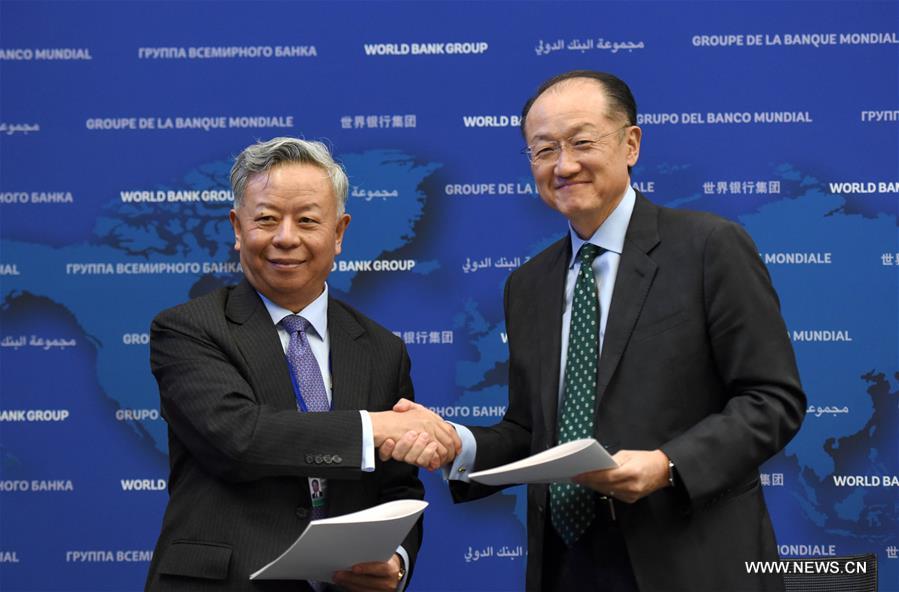
WASHINGTON D.C., April 13, 2016 -- World Bank President Jim Yong Kim (R) and Asian Infrastructure Investment Bank (AIIB) President Jin Liqun shake hands after signing the first co-financing framework agreement at the headquarters of World Bank in Washington D.C., the United States, April 13, 2016. World Bank and the AIIB on Wednesday signed the first co-financing framework agreement, paving the way for their cooperation on joint projects this year. (Xinhua/Yin Bogu)
WASHINGTON, April 13 -- The Asian Infrastructure Investment Bank (AIIB) is cooperating with the World Bank and the Asia Development Bank (ADB) and the three sides will approve the first batch of co-financed projects in June, AIIB President Jin Liqun said Wednesday.
"I would say a huge amount of chemistry has already been nurtured between the AIIB and the World Bank, the AIIB and the ADB," Jin said at an event hosted by the Asia Society Policy Institute.
"We are working with the World Bank and the ADB for co-financing. Maybe in June, we could have couples of projects approved by the World Bank, by the ADB, and by us" he said, adding that the AIIB is also "processing freestanding projects" prepared by its professionals.
Jin believed it's still sensible to work with the World Bank and the ADB to do co-financing even after the AIIB builds its own capacity, due to the risk and scale of infrastructure projects.
"Infrastructure projects are very large. It's not a very good idea for one bank to spend 2 billion or 3 billion U.S. dollars on one project," he said, adding that there is vast room for cooperation among multilateral development banks.
"When we work together, we can actually help the host country improve its macroeconomic policy environment," he argued.
As the pent-up demand for infrastructure could be as high as 10 trillion dollars over the next decade, Jin said there's no competition but "only cooperation and coordination" between the AIIB and other development banks.
Earlier in the day, the AIIB and the World Bank signed the first co-financing framework agreement, paving the way for their cooperation on joint projects this year.
"Signing this agreement enables our institutions to finance development projects together, and that is an important first step toward working with a new partner to address the world's huge infrastructure needs," World Bank President Jim Yong Kim said.
In 2016, the AIIB expects to approve about 1.2 billion dollars in financing, with World Bank joint projects anticipated to account for a sizable share, according to a statement by the World Bank.
While there are huge demands for infrastructure in Asia, Jin said the AIIB has to "be selective" and invest in good projects that meet its standards of "financially sustainable, environmentally friendly and socially acceptable."
Given the broad definition of infrastructure in the bank's mandate, Jin said the AIIB could provide finance for non-physical infrastructure like health and education in the future.
Jin also noted that the AIIB could support projects under China's Belt and Road initiative, but it was not created exclusively for this initiative.
"We would finance infrastructure projects in all emerging market economies even though they don't belong to the Belt and Road initiative," he said.
Proposed by China, the AIIB aims to support infrastructure projects in Asia and has 57 prospective founding members with an authorized capital of 100 billion dollars.
The bank was formally established in Beijing in December last year and started operation in January.
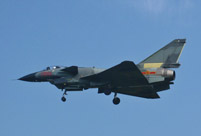 The evolution of J-10 fighter
The evolution of J-10 fighter Top 10 Asian beauties in 2016
Top 10 Asian beauties in 2016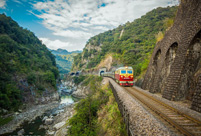 Train rides through blossoms
Train rides through blossoms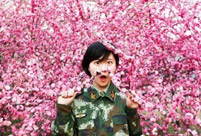 When female soldiers meet flowers
When female soldiers meet flowers North Sea Fleet conducts drill in West Pacific Ocean
North Sea Fleet conducts drill in West Pacific Ocean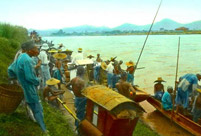 Old photos record the change of Sichuan over a century
Old photos record the change of Sichuan over a century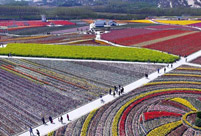 Breathtaking aerial photos of tulip blossoms in C China
Breathtaking aerial photos of tulip blossoms in C China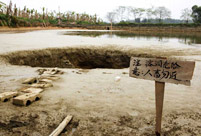 Horrific: Pit swallows 25 tons of fish overnight
Horrific: Pit swallows 25 tons of fish overnight Police officers learn Wing Chun in E. China
Police officers learn Wing Chun in E. China Top 20 hottest women in the world in 2014
Top 20 hottest women in the world in 2014 Top 10 hardest languages to learn
Top 10 hardest languages to learn 10 Chinese female stars with most beautiful faces
10 Chinese female stars with most beautiful faces China’s Top 10 Unique Bridges, Highways and Roads
China’s Top 10 Unique Bridges, Highways and Roads Foreigners weigh in on their experiences at Chinese hospitals
Foreigners weigh in on their experiences at Chinese hospitals Chinese TV series ‘Nirvana in Fire’ sets South Korea aflame
Chinese TV series ‘Nirvana in Fire’ sets South Korea aflame Public can’t make up for institutional failings
Public can’t make up for institutional failings China’s AI ambitions
China’s AI ambitionsDay|Week